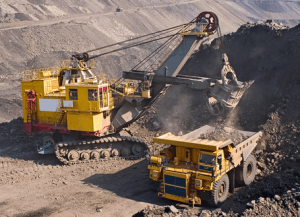Ghana government urge to amend Mining Act to increase involvement, benefits to citizens
 Mr Augustine Niber, a Legal Practitioner has called on the government to take steps to amend Ghana’s Minerals and Mining Act of 2006, Act 703, to promote more Ghanaian involvement in the mining activities to increase benefits to Ghanaians.
Mr Augustine Niber, a Legal Practitioner has called on the government to take steps to amend Ghana’s Minerals and Mining Act of 2006, Act 703, to promote more Ghanaian involvement in the mining activities to increase benefits to Ghanaians.
“At this stage of our mining, it is not the stage where we are trying to attract foreign direct investment and our law was developed to attract direct foreign investment but we have gotten to a stage where we should be determining what we take and not the stage where we need to entice investors to come into that particularly sector,” he said.
Mr Niber who is also the Executive Director of the Center for Public Interest Law (CEPIL), made the call at Bolgatanga in the Upper East Region on the sidelines of a two-day paralegal training workshop organised for selected mining community leaders in Northern Ghana.
The training was organised by the Transformation of Marginal Areas (TAMA Foundation) Universal, a civil society organisation in collaboration with the Centre for Public Interest Law (CEPIL) with funding support from the Ford Foundation.
Mr Niber explained that the current state of the Minerals and Mining Act which allowed for the wholesale of direct foreign investment in the mining sector needed to be reviewed as foreigners were benefitting more from the country’s mineral resources at the expense of Ghanaians.
He said the operations of the mining sector currently denied the country the needed benefits in terms of dividends, royalties among others and called for urgent national steps to amend the Act to allow for Ghanaian investment to promote equity in the mining sector.
“We should move beyond the issue of collecting taxes and go into the issue of participating in the production and earning the dividends that companies get from the mining sector,” he said.
The Legal Practitioner argued that there was the need to increase benefits to mining communities beyond compensation and resettlement packages and making them shareholders in the mining leases in their communities by virtue of their ownership of the lands.
To this extend, the Legal Practitioner proposed that mining communities should be engaged before leases were awarded to mining companies by central government instead of the traditional practice where the government awards the leases to the mining companies before the mining company engage the mining communities.
This, he said, would help curb most of the mining related conflicts experienced in the country.
“To a larger extend, community members are seen as stumbling block to mining investments and that is because it looks as though their investments on their lands are not important, their farmlands are not important, so they give the lands to another investor without equity sharing,” he added.
The training was part of the implementation of the phase two of the Natural Resource Accountability in Northern Ghana Project, dubbed, “NaRAING II”.
The project seeks to set up Community Action Groups as community level accountability structures to monitor, document, and report on acts perpetuated by mining companies as against the law, human rights abuses, and environmental law violations, among others.
The communities were selected from Bongo District and Bolgatanga Municipal in the Upper East Region, Sissala East and Sissala West Districts in the Upper West Region, Mamprugu Moagduri District in the North East Region, Tatale in Northern Region and Bole in the Savanna Region.
According to Mr Jonathan Adabre, the Operations Manager of TAMA Foundation Universal, the training was to equip the participants with advocacy and communication skills to enable them negotiate for better compensations and resettlement packages.
Source: GNA
